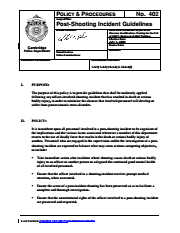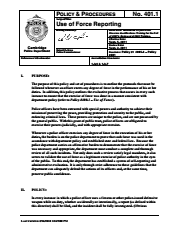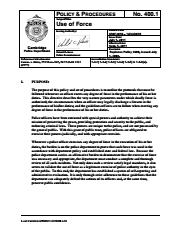Cambridge, MA Police Department Use of Force policy and training materials
| Submitted | May 4, 2015 |
MuckRock users can file, duplicate, track, and share public records requests like this one. Learn more.
Communications
From: Shawn Musgrave
To Whom It May Concern:
Pursuant to the Massachusetts Public Records Law, M.G.L. c.66, §10, I hereby request the following records:
All policies and training materials maintained by the department regarding use of force.
I also request that, if appropriate, fees be waived as we believe this request is in the public interest, as suggested but not stipulated by the recommendations of the Massachusetts Supervisor of Public Records. The requested documents will be made available to the general public free of charge as part of the public information service at MuckRock.com, processed by a representative of the news media/press and is made in the process of news gathering and not for commercial usage.
I expect the request to be filled in an accessible format, including for screen readers, which provide text-to-speech for persons unable to read print. Files that are not accessible to screen readers include, for example, .pdf image files as well as physical documents.
In the event that fees cannot be waived, I would be grateful if you would inform me of the total charges in advance of fulfilling my request. I would prefer the request filled electronically, by e-mail attachment if available or CD-ROM if not.
Thank you in advance for your anticipated cooperation in this matter. I look forward to receiving your response to this request within 10 calendar days, as the statute requires.
Sincerely,
Shawn Musgrave
From: Warnick,Jeremy
Dear Mr. Musgrave:
I am in receipt of your Public Records request, dated May 4, 2015, which is copied below.
Regarding your request for “all policies and training materials maintained by the department regarding use of force,” the Cambridge Police Department declines to provide policies and training materials relating to the use of force. In support of the denial of your request, the Cambridge Police Department cites M.G.L. c. 4, § 7(26)(b), and M.G.L. c. 4, § 7(26)(f) – The Investigatory Exemption. Exemption (b) applies to those records that are:
“related solely to internal personnel rules and practices of the government unit, provided however, that such records shall be withheld only to the extent that proper performance of necessary governmental functions requires such withholding.”
M.G.L. c. 4, § 7(26)(b). See also Commonwealth v. Donovan, 13 Mass. L. Rptr. 449 (2001) (holding that Department of Corrections policies and procedures concerning gang activity exempt from disclosure under M.G.L. c. 4, § 7(26)(b)).
M.G.L. c. 4, § 7(26)(f). Notably, under this exemption, “records custodians may withhold confidential investigative techniques indefinitely since their disclosure would prejudice future law enforcement efforts.” A guide to the Massachusetts Public Records Law, citing Bougas v. Chief of Police of Lexington, 371 Mass. 59, 62 (1976); United States Department of Justice v. Landano, 113 S. Ct. 2014, 2020 (1993).
The Cambridge Police Department asserts that the requested policies and procedures relate to the Cambridge Police Department’s internal workings and safety practices, and that the disclosure of such information would hinder the Department’s law enforcement efforts because public disclosure of these policies and procedures would enable individuals to circumvent such procedures. To that end, with the public release of such information, not only would investigations potentially be hampered, but more importantly, officers following these policies and procedures may also be placed at risk when engaging dangerous suspects. Accordingly, the requested policies are exempt from the Public Records Law under both exemption (b) and (f).
You are hereby notified that you may seek redress through the administrative process provided by the Supervisor of Records, Office of the State Secretary, One Ashburton Place, Room 1719, Boston, MA 02108. See M.G.L. c. 66, § 10(b); 950 C.M.R. 32.00.
Very truly yours,
Jeremy Warnick
Director of Communications & Media Relations
Cambridge Police Department
125 Sixth Street
Cambridge, MA 02142
@CambridgePolice<https://twitter.com/CambridgePolice>
From: Shawn Musgrave
Hello -
Before I proceed with appealing this request, I would like to give CPD the opportunity to reconsider. I respectfully point out that hundreds of police departments and law enforcement agencies across the country have released their Use of Force policies and training materials. This includes not only such police departments as BPD and NYPD, but also federal agencies. I've put a couple of examples below.
Boston Police Department: https://static1.squarespace.com/static/5086f19ce4b0ad16ff15598d/t/52af5f30e4b0dbce9d22a80d/1387224880253/Rule+303.pdf
New York Police Department: https://muckrock.s3.amazonaws.com/foia_files/203-12_Deadly_Physical_Force.pdf
Bureau of Customs and Border Protection: http://www.cbp.gov/newsroom/national-media-release/2014-05-30-000000/cbp-releases-use-force-policy-handbook-and-police
In light of the above, I hope that CPD will reconsider my request without the need for me to appeal to the Supervisor of Records. Not only do I consider your invocation of the Investigative Exemption to be a stretch of the statutory exemption and case law around it, but I also consider your wholesale rejection of this reasonable request to violate the very spirit of transparency that underlies the Massachusetts public records law.
I look forward to your reply.
Respectfully,
Shawn Musgrave
Investigative reporter, MuckRock
From: Warnick,Jeremy
Mr. Musgrave,
While we certainly appreciate and support transparency, we reaffirm our original response and concern that our officers following these requested policies and procedures may be placed at risk when engaging dangerous suspects. For this reason and the other statements previously outlined, we respectfully decline your request and, if you so choose, encourage you to seek redress through the administrative process provided by the Supervisor of Records, Office of the State Secretary, One Ashburton Place, Room 1719, Boston, MA 02108. See M.G.L. c. 66, § 10(b); 950 C.M.R. 32.00.
Sincerely,
Jeremy Warnick
Director of Communications & Media Relations
Cambridge Police Department
125 Sixth Street
Cambridge, MA 02142
From: Shawn Musgrave
Mr. Warnick -
I will submit that appeal today.
Again, I reiterate that such agencies as BPD, NYPD and federal law enforcement agencies — each of whose officers engage with dangerous suspects on a regular basis — have released their use of force policies in full, or at least in part.
This was meant to be a routine request, and I am genuinely surprised at your department's resistance. Just as you do, I certainly value officer safety. But you have not made clear at all how releasing this common policy might put CPD officers in danger.
Respectfully,
Shawn Musgrave
Investigative reporter, MuckRock
From: Shawn Musgrave
Supervisor of Records, Office of the State Secretary
One Ashburton Place, Room 1719
Boston, MA 02108
To Whom It May Concern:
This is an appeal of the denial in full of the below records request submitted to the Cambridge Police Department. This request, which was sent by email to CPD on May 4, 2015, seeks: "All policies and training materials maintained by the department regarding use of force."
In his May 13, 2015 email, Jeremy Warnick (CPD's Director of Communications & Media Relations) denied my request in full, citing M.G.L. c. 4, § 7(26)(b), and M.G.L. c. 4, § 7(26)(f). I shall address each of these exemptions in turn.
As elaborated by Mr. Warnick, exemption (b) applies to those records that are: “related solely to internal personnel rules and practices of the government unit, provided however, that such records shall be withheld only to the extent that proper performance of necessary governmental functions requires such withholding.” Foremost, the requested records are not solely internal personnel rules, but direct CPD officers how to interact with members of the public in the course of the department's work. It is also unclear how CPD's necessary functions might be hindered by the release of policies and training materials regarding use of force. As I wrote to Mr. Warnick by email on May 13, dozens of law enforcement agencies around the country have released identical materials, and none to my knowledge has been seen its work hindered as a result. I have noted some examples below:
The Boston Police Department has gone so far as to proactively post their use of force policy online (see https://static1.squarespace.com/static/5086f19ce4b0ad16ff15598d/t/52af5f30e4b0dbce9d22a80d/1387224880253/Rule+303.pdf).
The New York City Police Department released its entire manual in response to a request I submitted under the New York public records law, including its policy on use of deadly force (see https://muckrock.s3.amazonaws.com/foia_files/203-12_Deadly_Physical_Force.pdf).
At the federal level, the Bureau of Customs and Border Protection (CBP) also released its policy on use of deadly force and posted it online (see http://www.cbp.gov/newsroom/national-media-release/2014-05-30-000000/cbp-releases-use-force-policy-handbook-and-police).
Again, to my knowledge none of these agencies has seen their law enforcement function suffer or blocked by virtue of releasing materials relating to use of force. Rather, by releasing such materials, law enforcement agencies improve their necessary governmental role through public accountability. Upon releasing the use of force handbook last year, CBP Commissioner R. Gil Kerlikowske issued the following statement attesting to the value of such a release:
“This release and, most importantly, the policy and training changes they represent are the beginning of a continuous review of our responsibility to only use force when it is necessary to protect people. [....] Before my confirmation, I told Congress that transparency, responsiveness and communication are my hallmarks. I committed to an open dialogue between CBP and its stakeholders. Today’s actions on CBP’s policies address my priorities for the agency and are a significant step in CBP’s continuing progress."
Rather than hinder its necessary government function, CPD's release of use of force materials will contribute to its progress as a law enforcement agency that is accountable to the public it serves.
Additionally, Mr. Warnick's invocation of exemption(b) does not comport with the letter of the exemption, nor its interpretation by the Supervisor of Records. Per the Supervisor of Records (see http://www.sec.state.ma.us/pre/prepdf/guide.pdf), "The general purpose of the cognate federal exemption [to exemption (b)], however, is to relieve agencies of the burden of assembling and maintaining for public inspection matters in which the public cannot reasonably be expected to have a legitimate interest." As demonstrated by recent demonstrations and legislative hearings nationwide surrounding police accountability, there is more than a reasonable expectation that the public has a legitimate interest in CPD's use of force policies and training materials. As such policies and training materials direct how CPD officers interact with suspects, this is an area where public accountability and oversight are critical. There can be no such accountability without transparency around these policies.
The SPR's guide suggests as an example that exemption (b) might allow the Department of Corrections to withhold portions of its security response procedures. Even if this exemption applies in part to CPD's use of force materials, it certainly does not justify withholding these policies and training materials, in whole.
With regard to exemption (f), Mr. Warnick's interpretation is similarly incorrect. The investigatory covers “investigatory materials necessarily compiled out of the public view by law enforcement or other investigatory officials the disclosure of which materials would probably so prejudice the possibility of effective law enforcement that such disclosure would not be in the public interest." As the SPR's guide notes, however, the investigatory exemption does not "create a blanket exemption for all records that investigative officials create or maintain." Foremost, the requested documents do not pertain to investigative matters, but rather policies and training materials for engaging with suspects. .
Secondly, per SPR guidelines, "A records custodian must demonstrate a prejudice to investigative efforts in order to withhold requested materials." Mr. Warnick has failed to do so, and the release of similar materials by other agencies nationwide further underscores that CPD's investigative activities would not suffer by opening these materials to the public. The requested materials do not pertain to an ongoing investigation, nor to confidential investigative techniques. These are basic documents that direct CPD officers how to engage with suspects.
Dialogue around police-community relations requires transparency on the part of law enforcement, rather than arbitrary withholding of basic documents. Even if portions are sensitive, these can be redacted in part, rather than withheld in full.
In light of the above, I respectfully ask that you remand this request back to Cambridge Police Department for a good faith search and provision of the requested documents.
Respectfully,
Shawn Musgrave
Investigative reporter, MuckRock
From: Cambridge Police Department
Hi Shawn,
Please find a statement and a link to a set of policies we are releasing following your recent Use of Force request.
If you have any questions, please let me know.
Jeremy
Jeremy Warnick
Director of Communications & Media Relations
Cambridge Police Department
125 Sixth Street
Cambridge, MA 02142
O: 617-349-3237
@CambridgePolice
Statement - Request for Cambridge Police Department’s “Use of Force” Policies
The Cambridge Police Department recently received a request for the Department’s Use of Force policy and procedures. This request, as well as the recommendations contained in the President’s Task Force on 21st Century Policing Final Report, has led to an ongoing, constructive dialogue within the police department, City Manager’s office, and between the police and the Cambridge community.
While our long-standing position has been to withhold select information that relates to the Department’s internal workings and safety practices, further consideration and a desire to evolve and stay aligned with the recommendations cited in the 21st Century Policing Report has resulted in the Department concluding that it will release its Use of Force policy, as well as supplementary policies. You will find those policies on our website at http://bit.ly/CPDPolicies.
Over the coming weeks and months, we will also be making other policies available on our website – cambridgepolice.org – to give citizens an opportunity to review why and how our department operates in the manner that it does.
The responsibility we have to serve and protect members of the community and ensure the safety of our officers is one we don’t take lightly. The Cambridge Police Department recognizes and respects the public’s desire for transparency within government agencies. We believe that transparency can reinforce trust between the police and the communities they serve. By listening, engaging and integrating with the community, we have established meaningful relationships and trust with the citizens of Cambridge. To ensure that continues, we encourage ongoing dialogue while we continue to proudly protect and serve this great, safe city.
From: MuckRock
Files
pages



